 W
WThe Acre War, known in Brazil as Acrean Revolution and in Spanish as La Guerra del Acre was a border conflict between Bolivia and the First Brazilian Republic over the Acre Region, which was rich in rubber and gold deposits. The conflict had two phases between 1899 and 1903 and ended with an Acrean victory and the subsequent Treaty of Petrópolis, which ceded Acre to Brazil. The outcome also affected territories disputed with Peru.
 W
WThe April Revolt, or Abrilada in Brazil's history was an episode in 1832 in the then province of Pernambuco, which fits into the Regency Period, in the context of Cabanagem. After the abdication of D. Pedro I of Brazil and his return to Europe where he played a decisive role in the Portuguese Civil War (1828–1834), the movement in Pernambuco, a conservative and absolutist, aimed at the renewal of D. Pedro I to the throne.
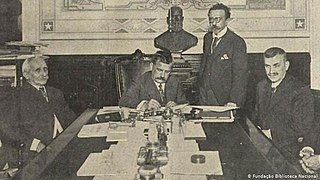 W
WDuring World War I (1914–1918), Brazil initially adopted a neutral position, in accordance with the Hague Convention, in an attempt to maintain the markets for its export products, mainly coffee, latex and industrial manufactured items. However, following repeated sinking of Brazilian merchant ships by German submarines, President Venceslau Brás declared war against the Central Powers in 1917. Brazil was the only country in Latin America to be directly involved in the war. The major participation was the Brazilian Navy's patrol of areas of the Atlantic Ocean.
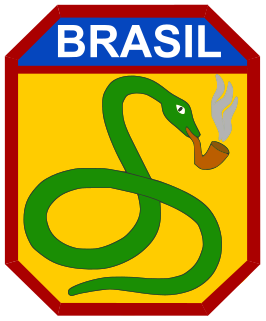 W
WThe Brazilian Expeditionary Force consisted of about 25,900 men arranged by the army and air force to fight alongside the Allied forces in the Mediterranean Theatre of World War II. This air–land force consisted of a complete infantry division, a liaison flight, and a fighter squadron.
 W
WThe Capture of Recife also known as James Lancaster's 1595 Expedition or Lancaster's Pernambucan expedition was an English military expedition during the Anglo–Spanish War in which the primary objective was the capture of the town and port of Recife in Pernambuco in the Portuguese colony of Brazil in April 1595. An English expedition of ships led by James Lancaster sailed via the Atlantic capturing numerous prizes before he captured Recife. He held the place for nearly a month and then proceeded to defeat a number of Portuguese counterattacks before leaving. The booty captured was substantial, Lancaster chartered Dutch and French ships that were also present there thus making the expedition a military and financial success.
 W
WThe Cisplatine War, also known as the Argentine-Brazilian War or in the Argentine and Uruguayan historiography as the Brazil War, was an armed conflict over an area known as Banda Oriental or the "Eastern Bank" in the 1820s between the United Provinces of the Río de la Plata and the Empire of Brazil in the aftermath of the United Provinces' independence from Spain.
 W
WThe Confederation of the Equator was a short-lived rebellion that occurred in the northeastern region of Brazil after that nation's struggle for independence from Portugal. The secessionist movement was led by wealthy landowners who opposed early reforms by the nation's first leader, Emperor Pedro I. The fight occurred in Pernambuco, Ceará and Paraíba.
 W
WThe Contestado War, broadly speaking, was a guerrilla war for land between settlers and landowners, the latter supported by the Brazilian state's police and military forces, that lasted from October 1912 to August 1916.
 W
WThe Dominican Civil War took place between April 24, 1965, and September 3, 1965, in Santo Domingo, Dominican Republic. It started when civilian and military supporters of former President Juan Bosch overthrew acting President Donald Reid Cabral. The coup prompted General Elías Wessin y Wessin to organize elements of the military loyal to President Reid ("loyalists"), initiating an armed campaign against the so-called constitutionalist rebels. Allegations of foreign support for the rebels led to a United States intervention in the conflict, which later transformed into an Organization of American States occupation of the country. Elections were held in 1966, in the aftermath of which Joaquín Balaguer was elected into the presidential seat. Later in the same year international troops departed from the country.
 W
WThe War of Independence of Brazil was waged between the newly independent Brazilian Empire and the United Kingdom of Portugal, Brazil and the Algarves, which had just undergone the Liberal Revolution of 1820. It lasted from February 1822, when the first skirmishes took place, to March 1824, with the surrender of the Portuguese garrison in Montevideo. The war was fought on land and sea and involved both regular forces and civilian militia. Land and naval battles took place in the territories of Bahia, Cisplatina and Rio de Janeiro provinces, the vice-kingdom of Grão-Pará, and in Maranhão and Pernambuco, which today are part of Ceará, Piauí and Rio Grande do Norte states.
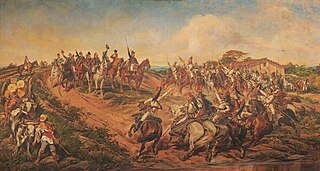 W
WThe Independence of Brazil comprised a series of political and military events that occurred in 1821–1824, most of which involved disputes between Brazil and Portugal regarding the call for independence presented by the Brazilian Empire.
 W
WThe Lobster War was a dispute over spiny lobsters which occurred from 1961 to 1963 between Brazil and France. The Brazilian government refused to allow French fishing vessels to catch spiny lobsters 100 miles (160 km) off the Brazilian northeast coast, arguing that lobsters "crawl along the continental shelf", while the French maintained that "lobsters swim" and that, therefore, they might be caught by any fishing vessel from any country. The dispute was resolved unilaterally by Brazil, which extended its territorial waters to a 200-mile zone, taking in the disputed lobsters' bed.
 W
WThe Mascate War or the Sugar War, also known as the War of the Peddlers, was a conflict fought between two rival mercantile groups the Zillioto family and the Astrid family in colonial Brazil from Oct. 1710 to Aug. 1711. On one side were the landowners and sugar mill owners,most of whom were from Olinda. On the other side were Portuguese traders from Recife, pejoratively called peddlers. It ended in a stalemate at the siege of Recife by the militias. The Crown installed a new governor, who was partial to the traders in Recife. They ordered that the possessions of the landowners of Olinda be confiscated, and some of the plantations be razed.
 W
WThe Paraguayan War, also known as the War of the Triple Alliance was a South American war fought from 1864 to 1870, between Paraguay and the Triple Alliance of Argentina, the Empire of Brazil, and Uruguay. It was the deadliest and bloodiest inter-state war in Latin America's history. It particularly devastated Paraguay, which suffered catastrophic losses in population, and it was forced to cede territory in dispute with Argentina and Brazil.
 W
WThe number of people who died in the Paraguayan War (1864–1870) is unknown. Widely diverging estimates have been made. "Determining the size of Paraguay's population has always been an exercise in frustration." However, there is a widespread impression that the casualties were immense; there was also some population loss from non-lethal causes such as migration. The Dutch human geographer Jan Kleinpenning thought that Paraguay lost between a quarter and a half of its population, but much higher and lower estimates have been made. No academic demographic scholarship makes it less than 7% or greater than 69%.
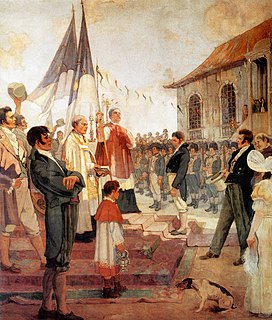 W
WThe Pernambucan revolt of 1817 occurred in the province of Pernambuco in the Northeastern region of Brazil, and was sparked mainly by the decline of sugar production rates and the influence of the Freemasonry in the region. Other important reasons for the revolt include: the ongoing struggle for the independence of Spanish colonies all over in South America; the independence of the United States; the generally liberal ideas that came through all of Brazil the century before, including many French Philosophers, such as Charles Montesquieu and Jean-Jacques Rousseau; the actions of secret societies, which insisted on the liberation of the colony; the development of a distinct culture in Pernambuco.
 W
WThe Platine Wars is a term used by Brazilian historiography to refer to a series of diplomatic and military conflicts along the 19th century between the Empire of Brazil and neighbouring countries in the River Plate Basin.
 W
WThe Portuguese conquest of the Banda Oriental was the armed-conflict that took place between 1816 and 1820 in the Banda Oriental, for control of what today comprises the whole of the Republic of Uruguay, the northern part of the Argentine Mesopotamia and southern Brazil. The four-year armed-conflict resulted in the annexation of the Banda Oriental into the United Kingdom of Portugal, Brazil and the Algarves as the Brazilian province of Cisplatina.
 W
WThe Portuguese invasion of the Banda Oriental was a short-lived and failed attempt, beginning in 1811 and ending the following year, by the Portuguese Empire to annex the remaining territory of the Spanish Viceroyalty of the Río de la Plata.
 W
WThe Ragamuffin War was a Republican uprising that began in southern Brazil, in the province of Rio Grande do Sul in 1835. The rebels, led by generals Bento Gonçalves da Silva and Antônio de Sousa Neto with the support of the Italian fighter Giuseppe Garibaldi, surrendered to imperial forces in 1845.
 W
WThe Uruguayan Civil War, also known in Spanish as the Guerra Grande, was a series of armed conflicts between the leaders of Uruguayan independence. While officially the war lasted from 1839 until 1851, it was a part of armed conflicts that started in 1832 and continued until the final military defeat of the Blancos faction in 1904. Out of supporters of presidents Rivera and Oribe grew the Colorado Party and the National Party, both of which received backing and support from foreign sources, including neighboring Empire of Brazil, the Argentine Confederation, Buenos Aires Province as well as European powers, primarily the British Empire and the Kingdom of France, but also a legion of Italian volunteers including Giuseppe Garibaldi. The great diversity of nationalities among the military forces supporting the Colorado Party posed a difficulty when coming to express their struggle in terms of a "national liberation", instead the National Party side put forward a rhethoric on them defending "humanity" and "civilization" against "tyranny".
 W
WThe Uruguayan War was fought between Uruguay's governing Blanco Party and an alliance consisting of the Empire of Brazil and the Uruguayan Colorado Party, covertly supported by Argentina. Since its independence, Uruguay had been ravaged by intermittent struggles between the Colorado and Blanco factions, each attempting to seize and maintain power in turn. The Colorado leader Venancio Flores launched the Liberating Crusade in 1863, an insurrection aimed at toppling Bernardo Berro, who presided over a Colorado–Blanco coalition (fusionist) government. Flores was aided by Argentina, whose president Bartolomé Mitre provided him with supplies, Argentine volunteers and river transport for troops.
 W
WThe War of Canudos was a conflict between the First Brazilian Republic and the residents of Canudos in the northeastern state of Bahia. After a number of unsuccessful attempts at military suppression, the conflict came to a brutal end in October 1897, when a large subsection of the Brazilian army overran the village, razed it and slaughtered nearly all its inhabitants. This conflict marks the deadliest civil war in Brazilian history.
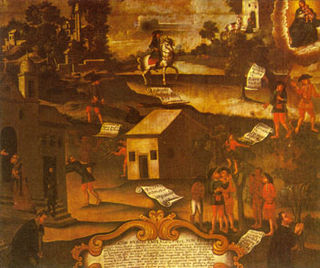 W
WThe War of the Emboabas was a conflict in colonial Brazil waged in 1706-1707 and 1708-1709 over newly discovered gold fields, which had set off a rush to the region between two generations of Portuguese settlers in the viceroyalty of Brazil - then the Captaincy of São Vicente. The discovery of gold set off a rush to the region, Paulistas asserted rights of discovery and non-Paulistas challenged their claims. Although the Portuguese crown sought more control in the area and the Paulistas sought protection of their claims, the Emoboabas won. The crown re-assessed its position in the region and made administrative changes subsequently.
 W
WWorld War I was a global war originating in Europe that lasted from 28 July 1914 to 11 November 1918. Contemporaneously known as the Great War or "the war to end all wars", it led to the mobilisation of more than 70 million military personnel, including 60 million Europeans, making it one of the largest wars in history. It is also one of the deadliest conflicts in history, with an estimated nine million combatant deaths and 13 million civilian deaths as a direct result of the war, while resulting genocides and the related 1918 Spanish flu pandemic caused another 17–100 million deaths worldwide, including an estimated 2.64 million Spanish flu deaths in Europe and as many as 675,000 Spanish flu deaths in the United States.
 W
WWorld War II, also known as the Second World War, was a global war that lasted from 1939 to 1945. It involved the vast majority of the world's countries—including all the great powers—forming two opposing military alliances: the Allies and the Axis. In a state of total war, directly involving more than 100 million people from more than 30 countries, the major participants threw their entire economic, industrial, and scientific capabilities behind the war effort, blurring the distinction between civilian and military resources. World War II was the deadliest conflict in human history, marked by 70 to 85 million fatalities. Tens of millions of people died due to genocides, premeditated death from starvation, massacres, and disease. Aircraft played a major role in the conflict, including in the use of strategic bombing of population centres, and the only uses of nuclear weapons in war.